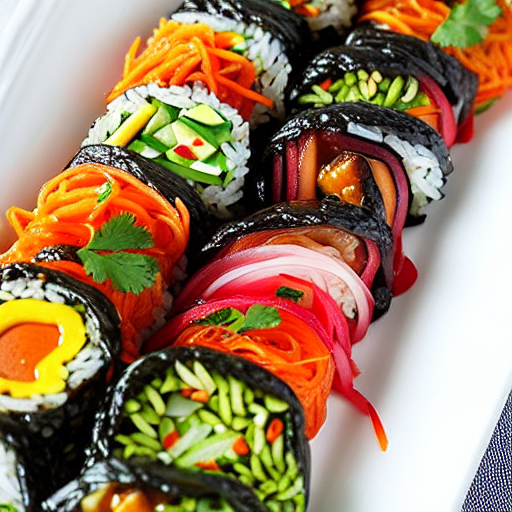Korean-style Gimbap
Korean-style Gimbap is a delightful and portable dish featuring seasoned rice and an array of colorful vegetables wrapped in seaweed. It’s a perfect dairy-free brunch option that offers a burst of flavor in every bite.

30 minutes
Difficulty: Medium
Japanese
300 kcal
Ingredients
- Cooked white rice - 1 cup
- Sesame oil - 1 tablespoon
- Salt - 1/2 teaspoon
- Nori sheets (seaweed) - 4 sheets
- Carrot - 1 medium, julienned
- Cucumber - 1 medium, julienned
- Spinach - 1 cup, blanched
- Pickled radish (danmuji) - 4 strips
- Egg - 1, beaten
- Soy sauce - 1 tablespoon (for dipping)
- Sesame seeds - 1 teaspoon (for garnish)
Steps
- Prepare the rice: Cook 1 cup of white rice according to package instructions. Once cooked, let it cool slightly, then mix in 1 tablespoon of sesame oil and 1/2 teaspoon of salt.
- Prepare the vegetables: Julienne the carrot and cucumber. Blanch the spinach in boiling water for about 30 seconds, then drain and rinse under cold water. Squeeze out excess water and set aside.
- Cook the egg: In a non-stick pan, scramble the beaten egg over medium heat until fully cooked. Once cooled, cut into thin strips.
- Assemble the gimbap: Place a nori sheet, shiny side down, on a bamboo sushi mat. Spread about 1/4 of the seasoned rice evenly across the nori, leaving a 2 cm border at the top.
- Layer the fillings: In the center of the rice, arrange a line of julienned carrot, cucumber, spinach, pickled radish, and scrambled egg.
- Roll the gimbap: Starting from the bottom, use the bamboo mat to roll the nori tightly over the fillings. Press gently to seal the edge of the nori with a bit of water.
- Slice and serve: Using a sharp knife, slice the roll into 1-2 cm pieces. Sprinkle with sesame seeds and serve with soy sauce for dipping.
Nutrition
- Calories: 300
- Protein: 7 g
- Carbs: 45 g
- Fiber: 4 g
- Sugar: 2 g
- Sodium: 500 mg
- Cholesterol: 186 mg
- Total Fat: 8 g
- Saturated Fat: 1 g
- Unsaturated Fat: 7 g
- Water: 0.1 L
Health Benefits
- Rich in antioxidants from vegetables, which support overall health.
- Provides a balanced source of carbohydrates and protein for energy.
Tags
JapaneseDairy-FreeBrunch